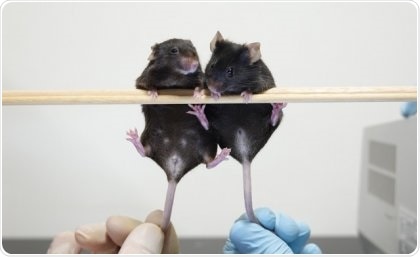Researchers have identified a new piece of DNA that is crucial for the formation of male sex organs in mice. This latest discovery may require the revisal of biology textbooks.

Left, XY mouse lacking Sry-T, that developed as female. Right, XX mouse carrying Sry-T transgene, that developed as male. Image Credit: Makoto Tachibana, Osaka University.
An international research association with The University of Queensland has identified the Y-chromosome gene responsible for making male mice is composed of two different parts of DNA and not one, as scientists had assumed before.
Emeritus Professor Peter Koopman, from the Institute of Molecular Biosciences at the University of Queensland, stated that the crucial fragment of DNA had been concealed from investigators for over three decades.
Expression of the Y chromosomal gene Sry is required for male development in mammals and since its discovery in 1990 has been considered a one-piece gene. Sry turns out to have a cryptic second part, which nobody suspected was there, that is essential for determining the sex of male mice. We have called the two-piece gene Sry-T.”
Peter Koopman, Emeritus Professor, Institute for Molecular Bioscience, University of Queensland
The researchers validated their theory and discovered that the male mice (XY) that lacked the Sry-T gene developed as female, whereas female mice (XX) that carried a Sry-T transgene developed as male.
The rate of success for the experiments was nearly 100%.
According to Emeritus Professor Koopman, the discovery would transform how evolution and basic biology was taught worldwide.
For the last 30 years, we’ve been trying to figure out how this works. Sry is a master switch gene because it flicks the switch for male development, it gets the ball rolling for a whole series of genetic events that result in a baby being born as a male instead of female. This new piece of the gene is absolutely essential for its function; without that piece, the gene simply doesn’t work.”
Peter Koopman, Emeritus Professor, Institute for Molecular Bioscience, University of Queensland
Emeritus Professor Koopman continued “We’ve discovered something massively important in biology here, because without Sry there can be no sexual reproduction and hence no propagation and survival of mammalian species.”
The breakthrough may apply to efforts for biological pest management or to exploit sex ratios in agriculture. However, Emeritus Professor Koopman quickly pointed out that, for practical and ethical reasons, the discovery cannot be used on human embryos.
Once we understand better how males and females are specified in non-human species of mammals, then it offers the opportunity to influence that process. The ability to select for the desired sex could dramatically increase efficiencies for agricultural industries such as the dairy industry (females) or the beef industry (males).”
Peter Koopman, Emeritus Professor, Institute for Molecular Bioscience, University of Queensland
“People have been trying to figure out ways to skew to the desired sex in these industries for a long time, and now that we understand more about the fundamental mechanism of Sry it may be possible through genetic means,” Koopman concluded.
Source:
Journal reference:
Miyawaki, S., et al. (2020) The mouse Sry locus harbors a cryptic exon that is essential for male sex determination. Science. doi.org/10.1126/science.abb6430.